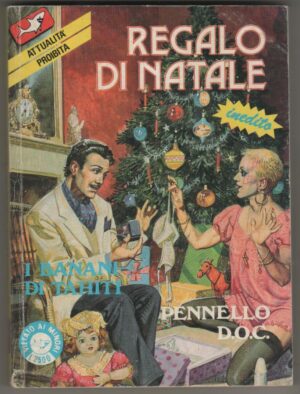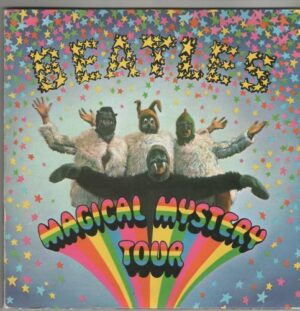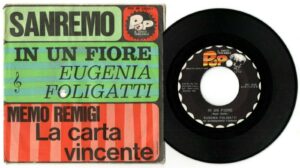Description
PREMESSA: LA SUPERIORITA’ DELLA MUSICA SU VINILE E’ ANCOR OGGI SANCITA, NOTORIA ED EVIDENTE. NON TANTO DA UN PUNTO DI VISTA DI RESA, QUALITA’ E PULIZIA DEL SUONO, TANTOMENO DA QUELLO DEL RIMPIANTO RETROSPETTIVO E NOSTALGICO , MA SOPRATTUTTO DA QUELLO PIU’ PALPABILE ED INOPPUGNABILE DELL’ ESSENZA, DELL’ ANIMA E DELLA SUBLIMAZIONE CREATIVA. IL DISCO IN VINILE HA PULSAZIONE ARTISTICA, PASSIONE ARMONICA E SPLENDORE GRAFICO , E’ PIACEVOLE DA OSSERVARE E DA TENERE IN MANO, RISPLENDE, PROFUMA E VIBRA DI VITA, DI EMOZIONE E DI SENSIBILITA’. E’ TUTTO QUELLO CHE NON E’ E NON POTRA’ MAI ESSERE IL CD, CHE AL CONTRARIO E’ SOLO UN OGGETTO MERAMENTE COMMERCIALE, POVERO, ARIDO, CINICO, STERILE ED ORWELLIANO, UNA DEGENERAZIONE INDUSTRIALE SCHIZOFRENICA E NECROFILA, LA DESOLANTE SOLUZIONE FINALE DELL’ AVIDITA’ DEL MERCATO E DELL’ ARROGANZA DEI DISCOGRAFICI .
BELL + ARC
self titled / same / eponymous
Disco LP 33 giri , 1971, the famous charisma label, CAS. 1053 , UK , first press, laminated gatefold cover / copertina apribile laminata , pink scroll label / etichetta col logo a rotolo rosa, credits on back sleeve: B & C Records
Ltd 37 Soho Square London W1 Sleeve printed & made by the E.J.Day Group, London and Bedford
CONDIZIONI OTTIME, vinyl ex++/NM, cover ex++
Bell & Arc è il primo ed unico album della omonima formazione britannica capitanata da Graham Bell, pubblicato per la Charisma nel 1971.
Bell & Arc was a British pop group that existed from 1970 to 1972.
It was formed when singer Graham
Bell teamed up with the group Arc,
whose original lineup was John
Turnbull (guitar, vocals), Mickey
Gallagher (keyboards, vocals), Tommy
Duffy (bass), and Dave
Trudex (drums). (Trudex
was replaced by Rob
Tait, who was then replaced by Alan
White.) Arc
made an album, Arc
at This (1970), before joining with Bell
and recording Bell
and Arc (1971). The group then split. Turnbull
and Gallagher
later joined Ian
Dury and the Blockheads.
- Interprete: Bell+Arc
- Etichetta: Charisma
- Catalogo: CAS 1053
- Matrici : CAS 1053 A-1U PECKO / CAS 1053 B-1U PORKY
- Supporto:vinile 33 giri
- Tipo audio: stereo
- Dimensioni: 30 cm.
- Facciate: 2
- Laminated gatefold sleeve / copertina apribile laminata , pink scroll label/etichetta rotolo rosa, white paper inner sleeve
Track listing
| A1 | High Priest Of Memphis | |||
|
Bass – Drums – Guitar – Piano – Vocals – |
||||
| A2 | Let Your Love Run Free | |||
|
Bass – Cornet – Drums – Guitar – Piano – Saxophone [Baritone] – Saxophone [Tenor] – Vocals – |
||||
| A3 | Keep A Wise Mind | |||
|
Bass – Drums – Guitar – Harmonica – Percussion – Piano – Vocals – |
||||
| A4 | So Long Marianne | |||
|
Bass – Drums – , Guitar – Organ – Piano – Vocals – |
||||
| A5 | She Belongs To Me | |||
|
Acoustic Guitar – Bass – Cornet – Drums – Guitar – Organ – Piano – Saxophone [Baritone] – Saxophone [Tenor] – Vocals – |
||||
| B1 | Yat Rock | |||
|
Bass – Drums – Guitar – Piano, Organ – Vibraphone [Vibes] – Vocals – |
||||
| B2 | Dawn | |||
|
Vocals, Guitar – |
||||
| B3 | Children Of The North Prison | |||
|
Bass – Drums – Guitar – Piano – Vocals, Guitar – |
||||
| B4 | Everyday | |||
|
Bass – Drums – Guitar – Percussion – Piano – Vocals, Harmonica – |
||||
Artwork By –
Ian Vincentini
Engineer –
Producer –
Written-By –
Bell + Arc
(tracks: A2, B4)
,
Bob Dylan
(tracks: A5)
,
Gibson*
(tracks: A3)
,
Graham Bell
(tracks: A1, A3, B1, B2, B3)
,
John Turnbull
(tracks: A3)
,
Leonard Cohen
(tracks: A4)
Recorded At Island studios, London.
The first building of Arc comprised of ex Skip Bifferty guitarist
John Turnbull & keyboardist Mick Gallagher who had just finished
writing the score for Get Carter. John was an innovator of the Gibson
SG, a vintage guitar which he eventually donated to Pete Townshend for
his US tour. Micky Gallagher was that surging keyboardist that played
with Frampton’s Camel and alongside Badger guitarist Brian Parrish when
he joined Gun. Also to come on board was ex John Lewis Blues Band Dave
Hedley on bass and ex Elcorts drummer Paul Nichols. Arc floated freely
at the Plumpton Rock Festival until ex Sect bassist Tommy Duffy and
drummer Dave Trudex Montgomery joined for the recording of their debut.
While Hedley made superb inroads with Every Which Way, Arc recorded
their 1971 At This opening up with the guitar riffing “Let Your Love
Run”, (inspired- Robert Heinlen’s Glory Road) with Duffy’s plundering
bass giving way to Turnbull’s high tone Gibson fuzz. This is an Arc de
force for Turnbull who really bends that Gibson like non before him. The
tempo change on “It’s Gonna Rain” is superb with Turnbull in full
reign. Again so like Ginhouse the album has no influences from any other
as they wheel through the innovative, yet sometimes whimsical riffs.
Eastern trips slip into the soothing “An Ear Ago” arguably the finest
track with Micky almost classical. “Great Lager Street” is also a
splendid styled creation that opens frenetically until the healing
bridges. Listen to the harmony swept “Hello Hello Monday” an anthem for
the working universe with Gallagher and Turnbull battling it out.
“Perfectly Happy Man” is a sensitive reading with exquisite guitar runs,
almost Jonesy.The album ends with the harmony laden “You In The
Garden”. After the album Battered Ornament bassist Rob Tait entered with
vocalist Graham Bell which evolved into Bell & Arc backed by the
brass Gonzales comprising Bud Beadle sax, Steve Gregory sax, Jeff Condon
trumpet, ex Jody Grind drummer John Woods and ex Happy Magazine Alan
White drums & Kenny Craddock guitar. Bell & Arc opened up with
the Skip Bifferty growling “High Priest Of Memphis” plus sandy covers of
Leonard Cohen’s “So Long Marianne” ( Cocker style) and Dylan’s “She
Belong’s To Me” don’t work, yet the soulful “Yat Rock” with Alan White
on vibes can hold its own with any Procol Harum. The standouts were
Bell’s acoustic “Dawn” and the gruff epitaph “Everyday” with comparisons
to Every Which Way.
Graham Thomas Bell (born 17 April 1948, Blyth, Northumberland — died 2 May 2008, London)
was an English
pop
and rock singer.
Bell’s father, Jimmy, was a well known local singer and his late
mother, Leonora Rogers, was in show
business prior to marriage after which she was heavily involved in
local music and dance. Graham made a solo single in 1966, and a solo
album in 1972 with Tim Hinkley, Mel
Collins and Ian Wallace. He was a member of Skip
Bifferty (later Heavy Jelly), and Every Which Way, a
band formed by Brian Davison formerly of the The Nice.
Musical style was jazzy progressive rock with guitar from John
Hedley (who was later part of Last Exit with Sting) playing call
and response with Bell’s blues shout vocals.
Bell joined his old mates from Skip Bifferty to form Bell &
Arc in July 1971, with John Turnbull, Mick Gallagher, Bud Beadle, Kenny Craddock, Steve Gregory,Tom Duffy and Alan White.
They rapidly built a strong following around London and in the phrase
current at the time “blew Joe
Walsh off the stage” at a sold-out gig at The Roundhouse.
Bell was tempted away as a solo artist to record an album with Bob
Johnson who produced Bob Dylan. He then appeared in Tommy. After this it was
reported that Pete Townshend produced an album for him but
it never saw the light of day. He was featured on the front page of
Sounds music paper in the late 1970s as a “the man most likely to” but
sadly his profile was affected by the rise of Punk and the new wave.
Bell then moved to America where he toured with Long John Baldry among
others before returning to his native North East in the mid 1980’s. He
also lived for a while in Cumbria before finally heading for London
(again) and cropping up in Snowy
White‘s Blues Agency in 1989.
He also played on Carol Grimes‘ Warm Blood in 1974, with Tommy
Eyre, Jess Roden, John
‘Rabbit’ Bundrick and Henry Lowther.
Graham Bell
(vocals)
Veteran vocalist from the
British scene. He released a solo single in 1966! It was ‘How do you
say I don’t love you / If you’re gonna go‘.
It was early 1966, when The Chosen Few get a
new
singer, Graham Bell, and change their band name to Skip Bifferty:
They established themselves in London. After
several
years as a tight unit, they released a self-titled album, Skip
Bifferty,
in 1968. Some of their songs were produced by Ronnie Lane, and arranged
by Steve Marriott.
In 1969, due to legal problems with their
manager
Don Arden, they changed their name (again), this time to Heavy Jelly,
releasing
a single, ‘I keep singing that same old song / Blue‘ (1968,
Island).
There were some later lineup changes. Dave
Potts
joined the band:
John
Turnbull (guitar, vocals)
Colin
Gibson (bass)
Mickey Gallagher
(keyboards)
Dave Potts (drums)
But Potts’ stay was short, being replaced by Alan
White:
John
Turnbull (guitar, vocals)
Colin
Gibson (bass)
Mickey Gallagher
(keyboards)
Alan White (drums)
But they parted ways that same year.
Bell was to reunite with Gibson and White very
soon,
while Gallagher and Turnbull formed Arc in 1970, but they soon were to
rejoin Graham, as we’re going to read.
After the Skip Bifferty/Heavy Jelly separation,
Gibson and White formed a new band, Happy Magazine, still in 1969. When
their vocalist left, Graham Bell was called, and the band changed the
name
to Griffin:
Pete Kirtley (guitar)
Colin
Gibson (bass)
Kenny Craddock
(keyboards)
Alan White (drums)
A terrific lineup. But they only released two
singles,
being ‘I am the dark noise in your head / Don’t you know‘ (1969)
the first one.
Colin Gibson and Craddock joined Ginger Baker’s
Airforce, and Alan White joined Balls (with Denny
Laine) for a while, also going to Ginger Baker’s Airforce. Graham
joined
a new band in May 1970: Every Which Way, formed by drummer Brian
Davidson
(ex-The Nice):
Alan Cartwright (bass)
Geoff Peach (flute)
Brian Davison (drums)
After a while, they included a 5th member:
John Hedley (guitar)
Alan Cartwright (bass)
Geoff Peach (flute)
Brian Davison (drums)
The band was short-lived, and after a debut album,
Every Which Way, and a successful presentation at The
Marquee,
they sadly split.
Graham started thinking about a solo career. He
wrote some demos, and called his old mates (now in Arc) to back him. All
went so well, that they decided forming a stable lineup, under the name
Bell & Arc:
John
Turnbull (guitar, vocals)
Tommy Duffy (bass,
vocals)
Mickey Gallagher
(keyboards)
Rob Tait (drums)
They released Bell & Arc, with
lots
of great guests: Kenny Craddock (guitar, keyboards), Bud Beadle (sax),
Steve Gregory (sax), Jeff Condon (trumpet), John Woods (percussion),
Alan
White (drums, percussion). But after the album, Rob Tait left, being
replaced
by John Woods:
John
Turnbull (guitar, vocals)
Tommy Duffy (bass,
vocals)
Mickey Gallagher
(keyboards)
John Woods (drums)
But John Woods wasn’t to stay too much time in the
band. For their American tour in November/December 1971, they got Alan
White:
John
Turnbull (guitar, vocals)
Tommy Duffy (bass,
vocals)
Mickey Gallagher
(keyboards)
Alan White (drums)
After the tour, Alan White left, being replaced by
a great drummer, Ian Wallace:
John
Turnbull (guitar, vocals)
Tommy Duffy (bass,
vocals)
Mickey Gallagher
(keyboards)
Ian Wallace (drums)
In January 1972, Gallagher left, and another great
replacement arrives, Kenny Craddock:
John
Turnbull (guitar, vocals)
Tommy Duffy (bass,
vocals)
Kenny Craddock
(keyboards)
Ian Wallace (drums)
But, after one month, they disbanded in February
1972.
Graham Bell went solo again.
He released his first solo album, Graham
Bell, that same year, with these musicians (some parts were
recorded
in UK, some parts in Nashville):
guitar,
harmonica)
Ron Cornelius (guitar)
Tim Drummond (bass,
vocals)
Tim Hinkley (keyboards)
Mel Collins (sax)
Eddie Mordue (sax)
Mark Charig (trumpet)
Kenny Wheeler (trumpet)
Nick Evans (trombone)
Gaspar Lawal (percussion)
Derek Quinn (percussion)
Ian Wallace (drums)
He also appeared in the symphonic version of The
Who’s
Tommy, released in November 1972. It was recorded with The
London Symphony Orchestra, The English Chamber Choir, plus a cast of
thousands:
Sandy Denny, Graham Bell (who sings lead in ‘1921‘), Maggie Bell,
Steve Winwood, Richie Havens, Merry Clayton, Ringo Starr, Rod Stewart,
Richard Harris, plus The Who, of course.
To celebrate the release, on December 9th, 1972,
the whole work was played live at The Rainbow, with mostly the same
artists
as in the album, plus some added stars, such as actor Peter Sellers, Roy
Wood, Roger Chapman, Elkie Brooks, David Essex, Marsha Hunt, Vivian
Stanshall,
etc. Graham Bell was also there.
And now I have a very big gap in Graham
Bell’s
career. Any help with info would be very appreciated.
Some time later, he formed a band with old
mate
Kenny Craddock. They were called Stotts, but their live was too short.
The next (happy) news was finding Graham
Bell again!
It was in 1988, when he joined exquisite guitarist Snowy White, in a new
venture, Snowy White’s Blues Agency:
harmonica)
Snowy White (guitar)
Kuma Harada (bass)
Jeff Allen (drums)
They released two albums, Change my life
and Open for business (rereleased under the title Blues
on
me). But they sadly split in 1990. All the members (except
Graham)
went to play with Mick Taylor All Star Band.
Does anybody know what is Graham doing now,
please?
Solo albums:
-
Graham Bell (1972, with Tim Hinkley,
Mel Collins, Ian Wallace)
Albums as Skip Bifferty:
-
Skip Bifferty (Sep 68, with Colin
Gibson, Mickey Gallagher, John
Turnbull)
Single as Heavy Jelly:
-
single ‘I keep singing that same old song / Blue‘
(1968) (with Colin
Gibson, Mickey Gallagher,
John
Turnbull)
Albums as Every Which Way:
- Every Which Way (1970)
Albums as Bell & Arc:
-
Bell & Arc (Jul 71, with John
Turnbull, Mickey Gallagher, Bud Beadle, Kenny Craddock, Steve
Gregory,
Alan White)
Albums as Snowy White’s Blues
Agency:
-
Change my life (1989, with Snowy
White,
Kuma Harada) -
Open for business (1989, with Snowy
White, Kuma Harada) (re-released as Blues on me)
Sessions:
-
Carol Grimes (Warm blood, 1974, with
Tommy
Eyre, Jess Roden,
John ‘Rabbit’ Bundrick, Henry Lowther)





